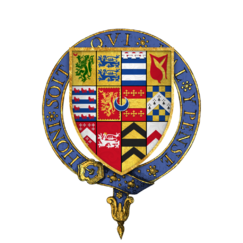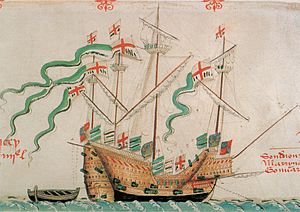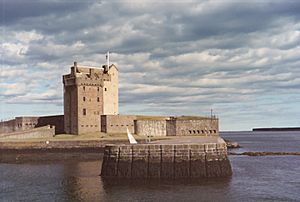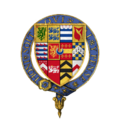Andrew Dudley facts for kids
Quick facts for kids
Andrew Dudley
|
|
|---|---|

Arms of Sir Andrew Dudley, KG
|
|
| Born | c. 1507 |
| Died | 1559 London
|
| Nationality | English |
| Known for | Soldier and courtier |
| Parent(s) | Edmund Dudley Elizabeth Grey, 6th Baroness Lisle |
Sir Andrew Dudley, a Knight of the Garter (born around 1507, died 1559), was an English soldier, a courtier (someone who serves at a royal court), and a diplomat (someone who represents their country in other nations). He was the younger brother of John Dudley, 1st Duke of Northumberland, a very powerful man.
Andrew Dudley served in the navy under Henry VIII. Later, he held important jobs at the royal court during the reign of Edward VI. From 1547 to 1548, he was an admiral, leading the fleet. He also took part in the War of the Rough Wooing in Scotland, where he was in charge of the English soldiers at Broughty Castle. In late 1551, he became the captain of the fortress of Guînes in France, which was then English territory.
In October 1549, Andrew Dudley became one of the main gentlemen in King Edward VI's private staff, called the Privy Chamber. He also became the keeper of the Palace of Westminster. This meant he was in charge of the King's clothes, jewels, and money. In early 1553, he went on a special trip to meet Emperor Charles V. His goal was to suggest peace talks between France and the Empire.
In June 1553, Andrew Dudley was going to marry Margaret Clifford. She was a cousin of Lady Jane Grey. However, his plans changed when Mary I became queen. On August 19, 1553, he faced serious charges because his brother had tried to make Lady Jane queen of England. He was released in January 1555 and lived in London until he passed away in 1559.
Contents
Andrew Dudley's Early Life and Career
Andrew Dudley was one of three sons of Edmund Dudley. His father was an advisor to King Henry VII. His mother was Elizabeth Grey. When Andrew was very young, his father was executed by the new king, Henry VIII. This happened because his father was blamed for the old king's money policies.
Andrew's older brother, John Dudley, later became the Duke of Northumberland. John helped Andrew get jobs serving the king. Andrew worked for Thomas Howard, 3rd Duke of Norfolk and also as an officer in the exchequer (a government department that handled money) in the 1540s.
Andrew Dudley served in the royal navy. In 1545, he commanded a new royal ship called the Swallow. In March 1546, he went on his first diplomatic trip to Mary of Austria, who was the ruler of Flanders. He delivered gifts from King Henry VIII, including special horses and hunting dogs.
Serving in Scotland (1547–1548)

In early 1547, Protector Somerset was the English regent (someone who rules for a young king). He wanted to restart the War of the Rough Wooing. This war was an effort to make sure Edward VI and Mary Queen of Scots would marry, as had been agreed.
On February 27, Andrew Dudley was made admiral of the fleet. His job was to bother the Scots in the North Sea and stop ships carrying weapons from France to Scotland. He was also ordered to show his fleet near St Andrews Castle. This was to encourage England's allies who were under siege there.
On March 7, Dudley captured a main Scottish ship, the Great Lion, near Dover. His ship, the Pauncey, fired at it. The French ambassador in London heard all about it. The Great Lion was too weak against the English ships and surrendered. The other Scottish ships also gave up, except for one. The Lion was later lost when it hit a sandbank while being pulled to Yarmouth. The English government praised Dudley for his brave actions against the Scots.
Dudley then sailed north to talk with the Scottish lords in Fife. These lords had killed Cardinal Beaton and were holding St Andrews Castle against the Scottish ruler. They had also captured the ruler's eldest son. These lords, known as the "Castilians," signed a deal with Dudley. They would get English help to hold the castle. They also promised to give St. Andrews Castle and the ruler's son to the English when they arrived.
Dudley also made a deal with Lord Gray. Lord Gray was a Scottish noble who owned Broughty Castle, a fort near Dundee. This castle was very important because it controlled the mouth of the River Tay. If the English held it, they could control Dundee and Perth. Lord Gray agreed to give up his castle and help take Perth.

St. Andrews Castle fell in July 1547. This made France more powerful in Scotland and led to an English invasion. Andrew Dudley helped at sea during this campaign. After the Battle of Pinkie Cleugh, Dudley was made a knight by Edward Seymour, Duke of Somerset. On September 20, 1547, he became the captain of the English soldiers at Broughty Castle. Lord Gray had given up the castle after a few cannon shots from the English ships.
Dudley complained that his soldiers were lazy. He also noted that the castle was in bad shape, with "scant window to shut, nor door, nor bolt." An Italian engineer helped fix and strengthen the castle.
Andrew Dudley made the town of Dundee agree to an alliance by firing on it from his ships in October 1547. He hoped to spread the Protestant Reformation by giving out Bibles in Dundee. Lord Gray continued to try and get Perth for the English, but they never managed to take the town.
In January 1548, Dudley sent some of his men to Fife to burn houses. He hoped this would make the Scots attack him. The Scots and French did attack Broughty but were pushed back. Dudley built a second fort near Dundee in March 1548. He was later replaced at Broughty by Sir John Luttrell.
Military and Court Roles
After his time in Scotland, Dudley served under Lord Russell during the Prayer Book Rebellion in August 1549. In early 1551, Dudley became captain of the English soldiers at Guînes in France. He got into a disagreement with Lord Willoughby, who was in charge of Calais. Both men were called back to England and later removed from their jobs in October 1552. During 1552, Dudley also inspected the coastal defenses of Portsmouth and the Isle of Wight to suggest improvements.
Under Edward VI, Dudley also got important jobs at court. He was part of the King's private staff, the Privy Chamber. On March 24, 1547, he was given charge of a large sum of money. After his brother John became more powerful in October 1549, Andrew became one of the four main gentlemen of the Privy Chamber. These four men were very close to the King and each received a good salary.
A year later, Dudley also became the keeper of the Palace of Westminster. Here, he made a list of all the King's clothes and household items. He was effectively in charge of the King's private money, receiving and paying out royal cash. He also looked after "all the jewels ... and other things in the palace."
Trip to the Emperor (1553)
In 1552, Dudley was made a Knight of the Garter. At the end of the year, he went on a diplomatic trip to discuss Edward VI's wish to help make peace between the Empire and France. He first went to Brussels, where he met Mary of Hungary on January 8, 1553.
He then met Emperor Charles V in Luxembourg. The Emperor was not feeling well and did not want to be bothered by diplomats. However, Dudley and the English ambassador managed to get an interview. On February 11, 1553, the Emperor met them in Brussels. He was friendly and even hugged Dudley. The English visitors noticed that the room was decorated with tapestries showing the Emperor's victories. Charles V said he wanted peace but wasn't sure if he could trust the French king.
When Dudley returned to England, he met with King Edward on February 19. The Emperor's agent reported that Dudley was careful and only mentioned that Charles had given him a gift. Dudley was also elected as a Member of Parliament for Oxfordshire in March 1553. He even carried King Edward's train during the Parliament's opening.
Marriage Plans and Difficult Times
In April 1553, King Edward ordered Dudley to release special fabrics for the wedding of his nephew Lord Guildford to Lady Jane Grey. This wedding took place on May 25. In June, it was reported that Dudley himself would marry Margaret Clifford. She was a granddaughter of Mary Tudor, Queen of France and a cousin of Lady Jane. Dudley had even set aside jewels and other items for the wedding.
However, King Edward VI died on July 6, 1553. He had named Lady Jane Grey as his heir. Andrew Dudley gathered 500 men to help his brother's effort to make Lady Jane queen. He was arrested on July 25 and put in the Tower of London.
Dudley faced serious charges with his family. He appeared in court on August 19, 1553. He admitted to the charges and only asked that his jewels, which were with a colleague, not be lost. On August 21, the day before his brother John was executed, Andrew attended mass with him and others who had been charged. Andrew's life was spared, and he was released in January 1555.
In April 1555, after he was officially pardoned, King Philip and Queen Mary gave Dudley a yearly payment. He was allowed to keep some of his belongings. He moved to Tothill Street in London. In July 1556, he wrote his will, saying he was "sick of body." He tried to get back jewels that had been given to the Earl of Cumberland for his planned marriage to Margaret Clifford. Among those who would receive money from his will were his nephews Ambrose, Robert Dudley, and Henry Sidney. Andrew Dudley passed away three years later, sometime before his will was officially approved on November 22, 1559.
Images for kids
-
The carrack Pauncy from the Anthony Roll
-
Broughty Castle, the English garrison of which Andrew Dudley commanded in 1547–1548
 | Percy Lavon Julian |
 | Katherine Johnson |
 | George Washington Carver |
 | Annie Easley |




